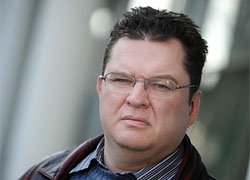New Eastern Europe: Poczobut shouldn't become a commodity for trading with the dictator
7- 25.06.2012, 16:13

Lukashenko should not be allowed to blackmail Belarusian journalists and West.
Andrzej Poczobut, a Belarusian Pole, a journalist and chair of the Board of the Union of Poles in Belarus (UPB) was arrested on June 21st 2012 in his home and taken to Grodno. The basis of his accusation – defamation of Alexander Lukashenko.
It was not the first time when Andrzej Poczobut was charged with defamation. He was charged with the same crime in the spring of 2011.
Now, after over a year, it is clear that Poczobut’s case is far from being history. Arrested a few days ago, jailed in Grodno, Poczobut once again is facing the exactly the same charges.
This time, however, events moved with light speed. Poczobut’s home was entered by two militia men and four people in civilian attire. There was no typical ransacking of the residence. The officials said that they would only take the journalist’s computer and were inviting him for an interrogation. Guessing that he would not come back from this interrogation very fast, Poczobut took with him some personal belongings. His wife, Oksana Poczobut, admitted that she had been expecting her husband’s arrest for over a month. And yet she also expresses hopes that this time things will go much faster than last time. What pushed the authorities’ button to arrest the journalist this time were the two articles he had written for the opposition media: Belarusian Partisan and Charter97.
No information was provided as to which articles exactly upset the authorities the most, but Igor Bancer, an activists with the Union of Poles in Belarus (UPB), believes that probably they were his texts on the deaths of those who had been accused of Minsk metro attacks in April 2011.
This time Poczobut faces four years of imprisonment. Andrey Bastunets, the vice-head of the independent Belarusian Association of Journalists, fears that this time Poczobut may indeed end up behind bars.
Up until now, Poczobut has not yet seen his. This Friday, the attorney will be requesting a meeting with his client. The news about Poczobut’s arrest again spread far and fast. Just like last time. Or maybe even more. Poland’s Prime Minister, Donald Tusk, officially declared that the Polish state had taken immediate actions to free the journalist. The prime minister also stated that Poland will do everything it can for Lukashenko’s government to finally start feeling European pressure.
“Our diplomats in Minsk and Grodno have received guidelines from our Ministry of Foreign Affairs to take up routine actions. We are sorry to say that these are routine actions as they have been repeating for some time,” stated the Polish prime minister.
Catherine Ashton, the European Union Head of Foreign Affairs, has also expressed her concern over Poczobut’s arrest. Poland’s Vice-Minister of Foreign Affairs, Jerzy Pomianowski, called the Belarusian Ambassador to Poland, Wiktar Gaisenak and handed him a protest note. How effective are these actions? We will see. Maybe even quite soon.
As of today, we don’t have an official statement made by Poczobut himself. However, his earlier experiences may allow us to say that he is a strong man who does not break very fast. In spring 2011 he wrote in a letter from his prison cell in Grodno: “I have no illusions on the aspirations of this government. Putting me in jail was meant to ‘force me to reflect’, which in the understanding of this regime, means betraying your own ideals, surrender.”
This is also when the Prosecutor of the Grodno district, Victor Morozov, apparently met with Poczobut and suggested that he wrote a letter to Lukashenko in which the journalist would beg for forgiveness and apologise. “Apologise for what?” wrote Poczobut “I have done nothing wrong. I was just doing my job and was critical in my analysis of what was going on in Belarus. Somebody in Minsk did not like that and that is why I am in jail now. Too bad. If needed, I will stay here. One year, two years, even four…” He was also calling on other journalists not to get blackmailed by Lukashenko’s political system should the authorities start using the journalists as bargaining cards.
The walls of Grodno prisons did not break the Poland’s Home Army during the Second World War, and as Poczobut said “They won’t break me either.”










